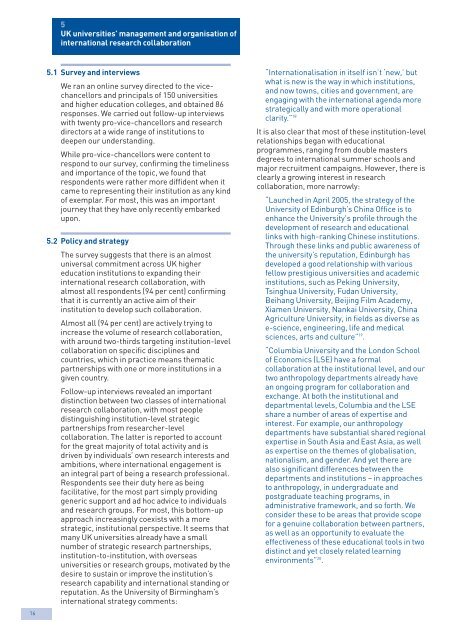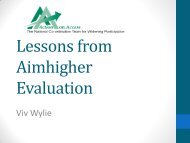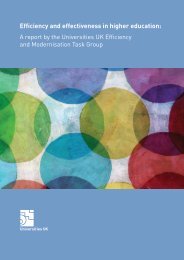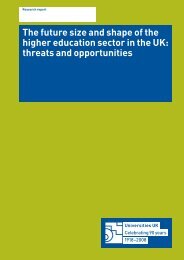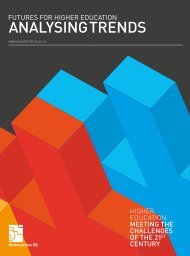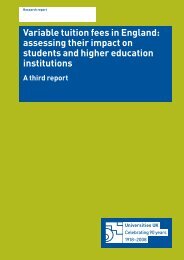International Research Collaboration - GlobalHigherEd
International Research Collaboration - GlobalHigherEd
International Research Collaboration - GlobalHigherEd
Create successful ePaper yourself
Turn your PDF publications into a flip-book with our unique Google optimized e-Paper software.
5UK universities’ management and organisation ofinternational research collaboration165.1 Survey and interviewsWe ran an online survey directed to the vicechancellorsand principals of 150 universitiesand higher education colleges, and obtained 86responses. We carried out follow-up interviewswith twenty pro-vice-chancellors and researchdirectors at a wide range of institutions todeepen our understanding.While pro-vice-chancellors were content torespond to our survey, confirming the timelinessand importance of the topic, we found thatrespondents were rather more diffident when itcame to representing their institution as any kindof exemplar. For most, this was an importantjourney that they have only recently embarkedupon.5.2 Policy and strategyThe survey suggests that there is an almostuniversal commitment across UK highereducation institutions to expanding theirinternational research collaboration, withalmost all respondents (94 per cent) confirmingthat it is currently an active aim of theirinstitution to develop such collaboration.Almost all (94 per cent) are actively trying toincrease the volume of research collaboration,with around two-thirds targeting institution-levelcollaboration on specific disciplines andcountries, which in practice means thematicpartnerships with one or more institutions in agiven country.Follow-up interviews revealed an importantdistinction between two classes of internationalresearch collaboration, with most peopledistinguishing institution-level strategicpartnerships from researcher-levelcollaboration. The latter is reported to accountfor the great majority of total activity and isdriven by individuals’ own research interests andambitions, where international engagement isan integral part of being a research professional.Respondents see their duty here as beingfacilitative, for the most part simply providinggeneric support and ad hoc advice to individualsand research groups. For most, this bottom-upapproach increasingly coexists with a morestrategic, institutional perspective. It seems thatmany UK universities already have a smallnumber of strategic research partnerships,institution-to-institution, with overseasuniversities or research groups, motivated by thedesire to sustain or improve the institution’sresearch capability and international standing orreputation. As the University of Birmingham’sinternational strategy comments:“<strong>International</strong>isation in itself isn’t ‘new,’ butwhat is new is the way in which institutions,and now towns, cities and government, areengaging with the international agenda morestrategically and with more operationalclarity.” 18It is also clear that most of these institution-levelrelationships began with educationalprogrammes, ranging from double mastersdegrees to international summer schools andmajor recruitment campaigns. However, there isclearly a growing interest in researchcollaboration, more narrowly:“Launched in April 2005, the strategy of theUniversity of Edinburgh’s China Office is toenhance the University's profile through thedevelopment of research and educationallinks with high-ranking Chinese institutions.Through these links and public awareness ofthe university’s reputation, Edinburgh hasdeveloped a good relationship with variousfellow prestigious universities and academicinstitutions, such as Peking University,Tsinghua University, Fudan University,Beihang University, Beijing Film Academy,Xiamen University, Nankai University, ChinaAgriculture University, in fields as diverse ase-science, engineering, life and medicalsciences, arts and culture” 19 .“Columbia University and the London Schoolof Economics (LSE) have a formalcollaboration at the institutional level, and ourtwo anthropology departments already havean ongoing program for collaboration andexchange. At both the institutional anddepartmental levels, Columbia and the LSEshare a number of areas of expertise andinterest. For example, our anthropologydepartments have substantial shared regionalexpertise in South Asia and East Asia, as wellas expertise on the themes of globalisation,nationalism, and gender. And yet there arealso significant differences between thedepartments and institutions – in approachesto anthropology, in undergraduate andpostgraduate teaching programs, inadministrative framework, and so forth. Weconsider these to be areas that provide scopefor a genuine collaboration between partners,as well as an opportunity to evaluate theeffectiveness of these educational tools in twodistinct and yet closely related learningenvironments” 20 .


